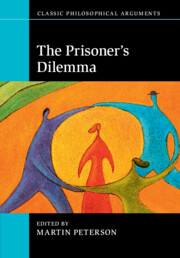Book contents
- Frontmatter
- Contents
- List of contributors
- Introduction
- 1 Why all the fuss? The many aspects of the Prisoner's Dilemma
- 2 How I learned to stop worrying and love the Prisoner's Dilemma
- 3 Taking the Prisoner's Dilemma seriously: what can we learn from a trivial game?
- 4 Prisoner's Dilemma doesn't explain much
- 5 The Prisoner's Dilemma and the coevolution of descriptive and predictive dispositions
- 6 I cannot cheat on you after we talk
- 7 Prisoner's Dilemma cannot be a Newcomb Problem
- 8 Counterfactuals and the Prisoner's Dilemma
- 9 The Tragedy of the Commons as a Voting Game
- 10 The role of numbers in Prisoner's Dilemmas and public good situations
- 11 The inner struggle: why you should cooperate with people you will never meet again
- 12 Prisoner's Dilemmas, intergenerational asymmetry, and climate change ethics
- 13 Prisoner's Dilemma experiments
- 14 The lesson of the Prisoner's Dilemma
- Bibliography
- Index
11 - The inner struggle: why you should cooperate with people you will never meet again
Published online by Cambridge University Press: 05 July 2015
- Frontmatter
- Contents
- List of contributors
- Introduction
- 1 Why all the fuss? The many aspects of the Prisoner's Dilemma
- 2 How I learned to stop worrying and love the Prisoner's Dilemma
- 3 Taking the Prisoner's Dilemma seriously: what can we learn from a trivial game?
- 4 Prisoner's Dilemma doesn't explain much
- 5 The Prisoner's Dilemma and the coevolution of descriptive and predictive dispositions
- 6 I cannot cheat on you after we talk
- 7 Prisoner's Dilemma cannot be a Newcomb Problem
- 8 Counterfactuals and the Prisoner's Dilemma
- 9 The Tragedy of the Commons as a Voting Game
- 10 The role of numbers in Prisoner's Dilemmas and public good situations
- 11 The inner struggle: why you should cooperate with people you will never meet again
- 12 Prisoner's Dilemmas, intergenerational asymmetry, and climate change ethics
- 13 Prisoner's Dilemma experiments
- 14 The lesson of the Prisoner's Dilemma
- Bibliography
- Index
Summary
Introduction
In Book IV of the Republic, Plato argues that the soul consists of three separate entities: reason, spirit, and appetite. In a key passage, Socrates and Glaucon discuss the inner struggle of a thirsty man who desires to drink at the same time as he feels an urge not to do so:
“The soul of the thirsty then, in so far as it thirsts, wishes nothing else than to drink, and yearns for this and its impulse is towards this.”
“Obviously.”
“Then if anything draws it back when thirsty it must be something different in it from that which thirsts and drives it like a beast to drink. For it cannot be, we say, that the same thing with the same part of itself at the same time acts in opposite ways about the same thing.”
“We must admit that it does not.”
…
“Is it not that there is something in the soul that bids them drink and a something that forbids, a different something that masters that which bids?”
“I think so.”
Plato was not a game theorist. And his theory of the soul is, of course, open to different interpretations. Despite this, game theorists have good reason to take seriously the idea, which is at least a possible interpretation of what Plato sought to say, that agents are complex entities made up of several distinct subagents. In this interpretation, the man described by Plato faces an inner struggle between a thirsty and a non-thirsty subagent, who have opposing preference orderings. The decision to drink is an outcome of the game played by these two subagents. What the external agent decides to do will depend on the structure of the game defined by the preference orderings of his internal subagents.
The aim of this chapter is not to defend any view about what Plato himself thought about the structure of the soul. My modest goal is to show that if we accept what I shall call the Platonic Theory of Subagents (and I shall call it “Platonic” irrespective of whether Plato actually endorsed it or not), then this has important implications for how we should analyze the Prisoner's Dilemma.
- Type
- Chapter
- Information
- The Prisoner's Dilemma , pp. 199 - 218Publisher: Cambridge University PressPrint publication year: 2015

